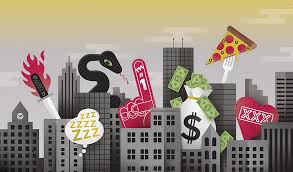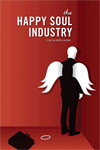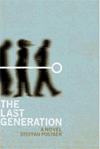This I cannot give up…
February 1, 2021

If we place instincts first…we will be pulled backward into disillusionment.
The line is from the Twelve & Twelve – a book Bill Wilson authored some twenty years after writing the Big Book of Alcoholics Anonymous. Cliff notes for the 12 Steps. He suggested recovering alcoholics begin removing their character defects lest they fall back into drinking. In keeping with the program’s Christian pedigree, defects were defined as the Seven Deadly Sins: Lust, Gluttony, Greed, Sloth, Wrath, Envy and Pride.
Lust wasn’t first on the list for nothing. Bill Wilson wrestled with his sexual appetites before and after getting sober and writing his manifesto. He adored his wife, revered her. But history suggests he liked the ladies, too. In the Big Book substantial text was devoted to prurient urges run amok. “Now about sex,” he wrote, “Many of us need an overhauling there.” You love AA was written by a man whose flaws did not go away after putting down the bottle.
Perhaps we shall be obliged in some cases still to say, “This I cannot give up yet…”
You’re not so depraved as to think this a loophole for misadventures. But you’re not willing to stop all of them either. You hadn’t been pulled backward into disillusionment. You were not bewildered by your actions. Yet. You were not dying inside. Yet. Nor were you drinking and using.
Yet.
The word clung. You didn’t need a sponsor to tell you how thin the ice was getting. You knew that you were playing a dangerous game, not only with your sobriety but with your family as well. In fact, you talked about it with your sponsor. Told him everything. He knew the primary reason you hadn’t stopped. You liked it too much.
Unthink.
December 26, 2020

“It was a beautiful day when I awoke but then I started thinking.” A great line uttered by a strange man. Dave is ex-military, ex-cop and now drives a canary yellow VW Bug. He still pines for his mother’s affection, though she’s been dead for decades. Dave is 80 years old. He has become a fixture at one of your meetings and not a beloved one. You see the others roll their eyes when Dave shares. At first, you did too. Dave’s a slow learner. He repeats himself. At his age moping about his momma is weird. Now you listen to the coot, searching for gemstones in the mud: … But then I started thinking.
Nearly 60 years old, the last 17 of them sober, you’d like to think you’re past the point of criticizing organized religion. Hating on the church is a cliché, though it seldom feels that way at first. Disavowing the sacred, calling it profane. It’s empowering. Then you start sounding like that snob who derides TV as a vast wasteland, or the Internet. Best to just get it out of your system. The man who keeps harping on the religion of his youth becomes no less tiring than Dave crying for his mother. Let it be. Popular religion is an opiate for the masses… the Budweiser of Higher Powers. Nothing wrong with it on Sunday. Most people in the program prefer a craft-brewed Higher Power. Spirituality is different from religion. Better than. Have they forgotten how outsiders view AA: a musty cult of chain smokers and book thumpers…Twelve Steps versus Ten Commandments?
Burning Question
December 19, 2020

The non-addict asks what is the meaning of life? The addict asks: Is this all there is? You called this many things: frustration, dissatisfaction, expectation… the yearning. Desiring something else. More. These unmet desires found respite in drugs and alcohol, albeit temporarily. But it was better than the alternative, or so it always seemed at the time, all the time.
When you finally found a church basement full of others like you, you thought: At last I am not the only one asking this question! It was the right idea, this revelation – a solid first draft. Alas, the yearning remained, humming like a generator, at times hissing, demanding, always there, always on.
Nor could you placate it with a Higher Power, not sufficiently. Your God wasn’t big enough. Is still not big enough. Would never be. But then came a realization as central as the question itself. It wasn’t that you stop asking: Is this all there is? But rather that you begin answering: Yes, this is all there is. And so be it.
Why Are You Here?
December 11, 2020

He was “a piece of shit junkie.” His words. Clean almost a year Jake begins a harrowing lead. His entire family are addicts (active or dead) and, not surprisingly, he had started using early in life, in the 5th grade, whatever he could get his hands on: weed, booze, cocaine, meth… Then he tried heroin. And like so many others before him, junk quickly became the apex predator of his body and soul. The warm embrace was a python. It did not let go. He tried to free himself from its grip; spent nine months in rehab, only to get loaded within days of his release. “It was the same as ever,” he said, “only worse.” Jake’s mother, a methadone addict, gave him a piece of advice based on her experience: “Just stop trying, son. It ain’t worth it.”
Remarkably, he did not listen to her. Instead, he took the “rock star cure” and spent a brutal week detoxing at the Four Points Sheraton. Luckily, Jake had some friends left in the world. From the hotel, they drove him to a rehab and this time it stuck – so far anyway, one day at a time. Jake credits the facility’s emphasis on AA for getting him this far.
As is custom, he must now choose a topic for the group’s discussion. “Why are you here?” He asks.
Great fucking question, capturing the long-term implications of sobriety as well as its immediacy. This meeting. This evening. When you share you typically respond to the speaker’s lead rather than the suggested topic. This time you answer the question:
“It was 7:40 pm, the sun was setting, my family was out doing their thing, the dogs were asleep on the floor. I was alone. I had a few hundred dollars, a car, my laptop, and my phone. I had everything I needed to get into all kinds of trouble. I didn’t want to drink or get high but I wanted something. Desperately. I just couldn’t put my finger on what it was… I never can.”
The Big Book calls it being “restless, irritable and discontent.” Yearning caused by the hole in your soul; something you used to fill with vodka and pills. Sober a long time now, there is still a cavity with a drain at the bottom and its pull is intense. You reckon with yearning every day and especially at night. AA suggests you ask God to remove its power, its gravitational pull, to fill yourself up with Him. God released you from the bondage of drugs and alcohol. Therefore, he can release you from the bondage of self.
“Alas, I’m not the praying kind,” you tell the group. “When the yearning washes over me I need to do something tangible. I need a safe place to go, a lifeboat. I need this group. That is why I am here.”
When Harry Met Humility
October 23, 2020

Toward the end of his life, in 1965, Bill Wilson, the founder of Alcoholics Anonymous put forward that his program came down to two main precepts: humility and responsibility. Admitting one was powerless. Then doing something about it. Alcohol had been the catalyst, teaching humility the hard way, through humiliation. Learning the value of responsibility began by recognizing unmanageability for what it was: chaos. Yet, that was just the first step. Sober for years, and nearing the end, Bill W was talking about more than mere abstinence. To achieve serenity, he posited, one had to be humble and responsible. Grace was thusly earned.
When you were a boy you had loved watching Kung Fu on TV. David Carradine played a peace-loving Shaolin monk, Kwai Chang Caine, who wandered the old west confronting and confounding hombres and roughnecks with his Eastern Philosophy. Caine had great humility. Unfortunately, that was not a popular attribute in Tombstone. In every episode Caine did all he could to practice humility in the face of insult, bigotry and violence. Invariably, he would get pushed too far. A bad guy would step on his little grasshopper and that was it. Caine had no choice but to kick some ass.
Thank fucking God. Otherwise Kung Fu would have been a dull meditation on passive resistance. You accepted the show’s weekly lessons in humility precisely because you knew what was coming: fists of fury and flying kicks! There wasn’t a 12 year-old boy in America who didn’t feel the same way. The bullies liked the exotic fighting. You liked the revenge. Either way blood spilled. Humility wasn’t enough. Truth is, you’ve always known the difference between humility and humiliation. That wasn’t the tricky part. The first problem with humility was that it was for sissies, because they had no choice. That and it was boring. Bill W wrote AA is a program of action. Clearly, the definition of that word had to change too.
A man spoke at a meeting, named Harry. He was a bit older than you. Wore a rumpled suit. Thick glasses. He spent much of his allotted time talking about how important wealth had once been to him. He’d been a big shot and proud of it. The house. The cars. The stuff. Counting his money, measuring his worth. He drank to celebrate victories at work, over peers and competitors alike. Drank even more to wash away failures, which of course became ever more common. Yet, he said, when he finally did stop drinking, he became even worse. “Without alcohol in the way, I could really fuck people over.” By his own admission, it took decades before he wizened up and acquired even a modicum of humility. Such was the intoxication of his pride. Listening to him share, you could still detect it. The way he mentioned his past achievements and former possessions, listing them like awards. Even after 30 years of sobriety and thousands of AA meetings he still couldn’t let go, not completely.
You could relate. You were always too quick to mention your past accomplishments, as if people were keeping score. Not so deep down you always felt they were.
Harry worked in retail now, far beneath his pay grade. Gone were the fancy cars, lavish homes and glitzy vacations. He found value by putting in a solid effort and going to bed tired. That’s what he said. He also admitted this was not easy for him. Many days he railed at his lot. Felt superior to his superiors. Beat him self up for all he had lost. Then, if he were thinking straight, he’d call his sponsor. God gives you what you need, Harry, the man would tell him. You’re responsible now. You’re practicing humility.



 The Happy Soul Industry
The Happy Soul Industry The Last Generation
The Last Generation